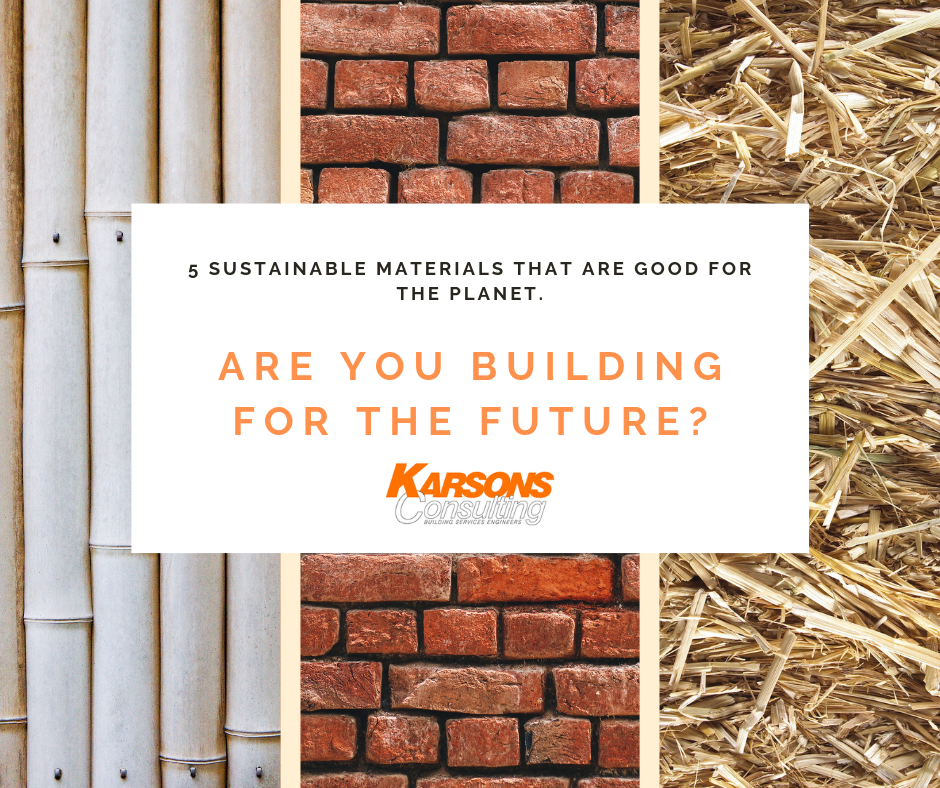
5 sustainable materials that are good for the planet.
Straw Bales
Forget everything fairy tales have taught you about building materials, straw is the future of housing. Packed inside wall framing, the substance can be used to replace concrete, wood, gypsum, fibreglass or stone. Because straw is a by-product of farming it is considered a sustainable resource, ordinarily farmers either burn it off or sell it for animal bedding as it (unlike hay) cannot be fed to livestock. If you’re worried about durability, studies have been conducted by Bath University to determine the efficacy of this building material. The test subjected a two story straw bale house with hemp cladding to temperatures of 1000°C for two hours (4 times longer than legal fire resistant requirements). The building did not ignite. Wind testing also saw the straw house withstand the force of a hurricane, far more than what your average wolf is capable of huffing or puffing.
Timbercrete
A relatively new invention, Timbercrete combines sawmill waste, cement and sand to create a building material that is not only durable but is 2.5 lighter than concrete. Unlike traditional bricks or pavers, Timbercrete has carbon st orage properties made possible through its sawdust mixture. It also outperforms concrete, clay and timber on fire resistance and is an excellent insulator. Probably the coolest thing about this new-age miracle material is that it’s bulletproof, being able to withstand
a 50 calibre metal jacket round without breaking!
Bamboo
One of the most versatile plants on the planet, it’s no surprise that bamboo is also great for building houses. It has a high tensile strength, grows quickly and can thrive in a variety of environments across the world. Its growth speed is key to its sustainability; while it can take a hardwood tree approximately 35 years to mature, bamboo can be restocked in just 5 - 7 years.
Due to its cylindrical shape, bamboo is stronger than concrete in terms of compression and it is much lighter than traditional building materials because it is hollow. It is also naturally water resistant and if treated correctly is fire retardant. While it may not be popular in the UK, many houses across the world are benefiting from this abundant natural building material.
Cork
You probably don’t think of it as the sturdiest of building materials, but cork is surprisingly good for much more than preserving your wine or holding a post-it note. In recent years, cork has become apopular sustainable material used for flooring, rigid insulation, acoustic wall coverings on countertops. Cork is filled with air pockets, which provide a cushion layer that is comfortable to walkon and it is these air pockets that trap not only hot and cold air but also sound, proving useful for insulation of all kinds.
Cork is considered a sustainable building material as it is organic in nature and harvested directly from the bark of the Cork Oak Tree. Taking 20 years to mature, the bark is cut from the trunk to be processed. As resilient as the material it yields, Cork Oaks are the only tree capable of having all their bark removed without being killed. Because of this, in 9 years the tree will once again be ready for harvest. The tree has also evolved to be anti-microbial, properties that allow cork to be resistant to mould and mildew, making it perfect for kitchens and bathrooms.
Ferrock
Initially created by accident, Ferrock is another modern contender to replace concrete. The material is made 95% recycled resources and includes steel dust (normally destined for landfill) and silica from ground up glass. The result is a material that is stronger than concrete and (more importantly) carbon neutral. Ferrock is also relatively flexible, making it perfect for areas that experience seismic activity. One of the unique properties of the material is that it becomes stronger when exposed to salt water, making it perfect for marine-based construction projects.
If you’re interested in helping you building become energy efficient and sustainible, contact Karsons here and we’ll audit your building with a guarantee that we can help lower your EPC rating and help it become a building for the future.
Karsons Consulting are members of the Chartered Institute of Building Services Engineers, The Association of Consultancy and Engineering, British Institute of Facilities Managers and the Building Services Research and Information Association.